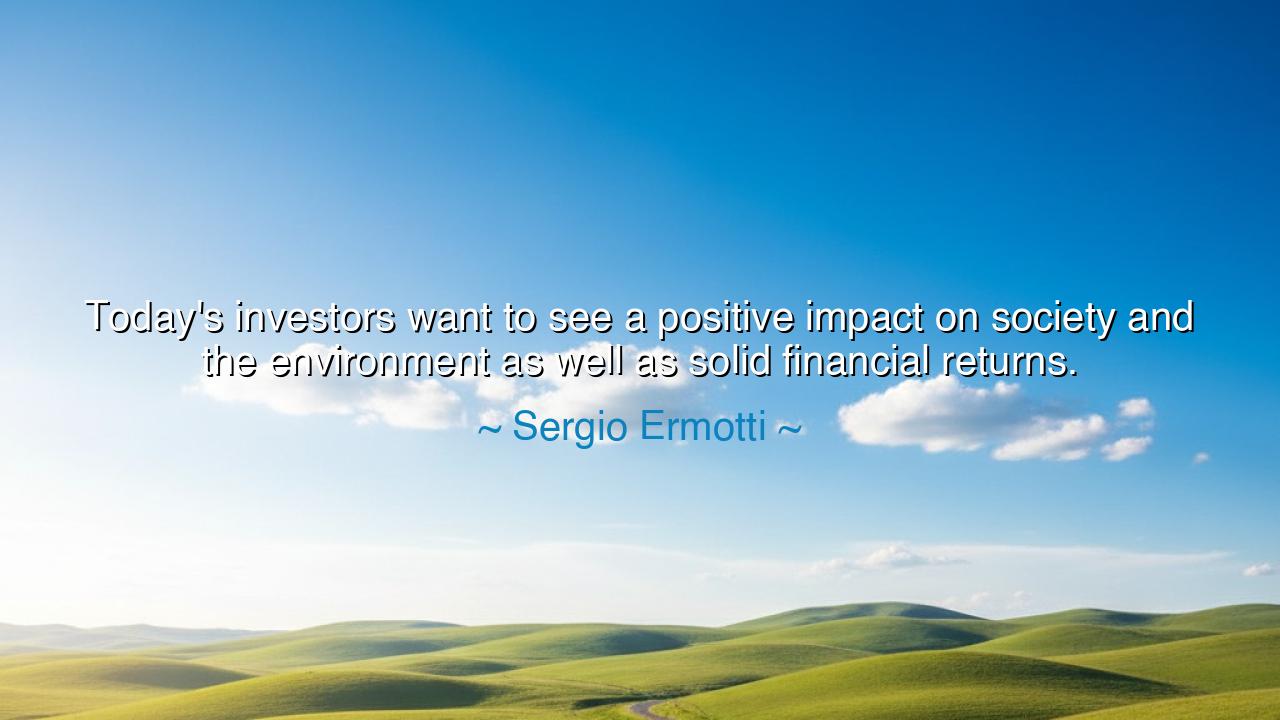
Today's investors want to see a positive impact on society and
Today's investors want to see a positive impact on society and the environment as well as solid financial returns.






The words of Sergio Ermotti, “Today’s investors want to see a positive impact on society and the environment as well as solid financial returns,” shine with the light of a new age of accountability. No longer is wealth measured solely by gold or profit; it is measured also by the good it brings to the world. He names a truth that has risen from centuries of unchecked pursuit of gain: that riches without responsibility become chains, but riches with positive impact become blessings for generations.
The origin of this wisdom lies in the shifting tides of global commerce. For too long, corporations and their investors turned a blind eye to the wounds left behind in pursuit of profit—polluted rivers, exploited workers, ruined lands. But as the earth groans under climate change, and as the cries of inequality grow louder, a new demand has risen: that capital itself must serve life, not destroy it. Ermotti, as a steward of finance, names this transformation: today’s wealth is not only counted in returns, but in its ability to uplift society and heal the environment.
History reminds us of this truth. Consider the Industrial Revolution: a time of great financial returns, but also of choking smoke, child labor, and vast slums. Out of that suffering arose reformers—like Robert Owen, who sought to create “model communities” where workers were treated with dignity. His vision was mocked in its day, yet it foretold what Ermotti now proclaims: that true prosperity demands balance, that investors must value human and environmental well-being as much as profit itself.
In modern times, we see this shift in action. The rise of impact investing and the growth of renewable energy are proof that money can be both fruitful and healing. When communities invest in clean power, when firms uplift women and the poor, when farmers are supported to grow food sustainably, then profit becomes not a curse but a gift. These are the seeds of a new financial ethic—one where investors ask not only, “What will I gain?” but also, “What will the world gain from my gain?”
Ermotti’s words also remind us of the sacred bond between stewardship and power. Wealth is a force, and like all forces, it can build or it can destroy. To seek only financial returns without thought of consequences is to live as a conqueror who leaves ruins in his wake. But to demand positive impact as well is to live as a builder, whose legacy endures long after the profits are spent. Here lies the wisdom: money alone does not measure greatness—its use for the good of all does.
The lesson for us is clear: whether we hold great riches or only a little, our choices shape the fate of others. Each purchase, each investment, each act of support is a vote for the kind of world we wish to build. Do not think of wealth as only personal, for it touches rivers, skies, and future generations. To follow Ermotti’s teaching is to see money as a servant of justice and compassion, not merely as a master of desire.
Practical actions flow from this truth. Choose to invest, even in small ways, in enterprises that respect the earth and uplift humanity. Support businesses that honor fair wages, sustainability, and dignity. Demand from leaders and corporations that profit must never come at the expense of life. In your daily life, practice this ethic by asking: Does this choice bring balance? Does it contribute to healing? In so doing, even the smallest coin becomes a seed of positive change.
Let future generations remember: true investors are not those who amassed the most wealth, but those who turned their wealth into light. As Ermotti teaches, solid financial returns are good, but when joined with a positive impact on society and the environment, they become a legacy worthy of remembrance. Wealth without wisdom perishes; wealth with purpose endures like a tree whose roots drink deeply and whose branches shelter all.






PHPhuong Hanh
Sergio Ermotti’s statement points to a significant change in how investments are evaluated today. It’s great to think that financial success can now be paired with positive societal and environmental outcomes, but can this new expectation be sustained in the long term? How much of an impact do companies really make on society, or is it more about marketing strategies designed to appeal to socially conscious investors?
GDGold D.dragon
I find this quote particularly relevant as it highlights the growing importance of sustainability and social impact in today’s investment decisions. Does this mean that more companies will have to adapt their business models to align with these values, even if it means sacrificing short-term profits? How will traditional investors, who prioritize financial returns, react to this shift towards purpose-driven investing?
NNNguyet Nguyen
The idea that investors now seek both positive impact and financial returns is exciting. It suggests that the financial world is evolving and becoming more socially conscious. But how widespread is this shift in priorities among investors? Are we seeing this trend across all industries, or is it mostly focused on sectors like sustainable energy and tech? What are the long-term effects of this shift on corporate strategies?
TTTrieu Thi Trang
Sergio Ermotti’s quote really captures the changing mindset of investors today. It’s no longer just about financial returns; people want to know that their investments are making a difference. But how do we balance the need for positive societal and environmental impacts with the desire for solid financial gains? Are these two goals always compatible, or do we sometimes have to compromise one for the other?